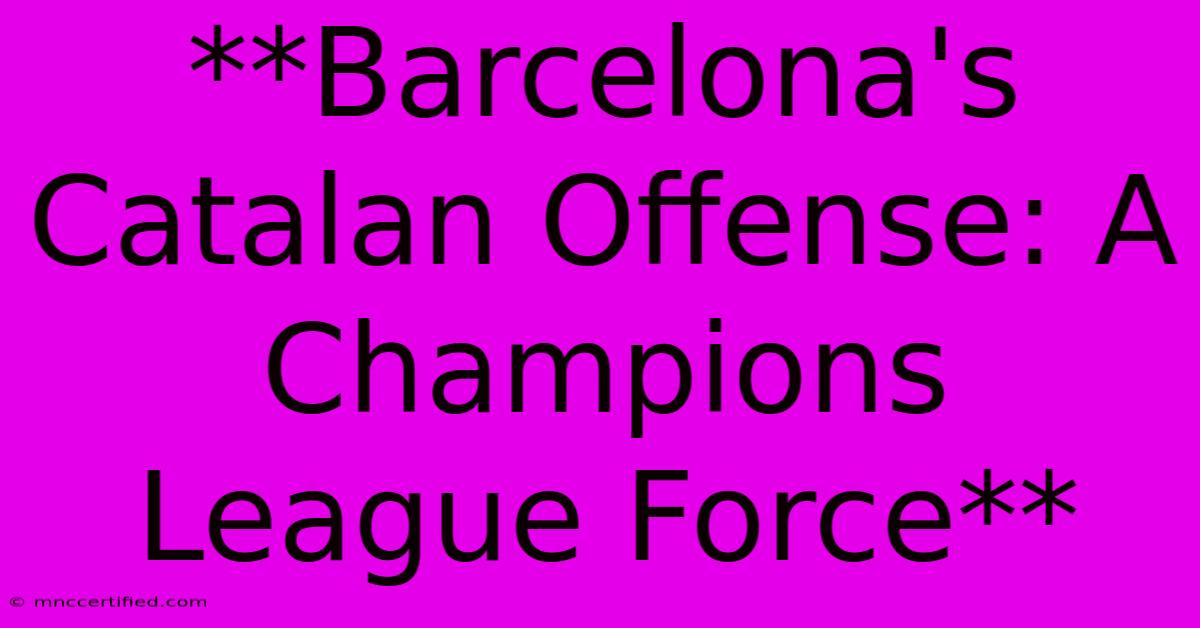**Barcelona's Catalan Offense: A Champions League Force**

Table of Contents
Barcelona's Catalan Offense: A Champions League Force
Barcelona, a name synonymous with beautiful football, has consistently been a dominant force in the Champions League. Their success can be attributed to their unique style of play, the Catalan offense, which has captivated football fans worldwide for decades.
The Foundations of the Catalan Offense
The Catalan offense, often referred to as "tiki-taka", is characterized by its intricate passing, fluid movement, and emphasis on possession. The core principles of this tactical approach were laid down by legendary manager Johan Cruyff during his time at Barcelona in the 1970s and 1980s. He instilled a philosophy that prioritized:
- Short, precise passes: The foundation of the Catalan offense is quick, accurate passing, often in triangles, to create space and move the ball swiftly.
- Fluid movement: Players constantly shift positions, creating overloads in certain areas and drawing defenders out of position.
- Maintaining possession: Barcelona strive to dominate the ball, suffocating opponents with their relentless passing and keeping the pressure on their defense.
- Attacking from all angles: The Catalan offense utilizes the full width and depth of the pitch, creating numerous scoring opportunities through both individual brilliance and collective play.
The Evolution of Tiki-Taka
While the core principles remain, the Catalan offense has evolved over the years, adapting to changing players and opponents. Under Pep Guardiola, the team's possession-based style reached its peak, with a focus on precise passing and a relentless pursuit of control.
Barcelona's Champions League Legacy
Barcelona's Catalan offense has delivered incredible success on the European stage. They have won the Champions League five times, a testament to the power of this unique playing style.
Here are some of their most memorable triumphs:
- 1992: Barcelona, under Johan Cruyff, clinched their first-ever Champions League trophy, defeating Sampdoria in a dramatic final.
- 2006: A dominant performance in the final against Arsenal, showcasing the fluidity and creativity of the Catalan offense.
- 2009: A memorable treble-winning season, with the Champions League final against Manchester United being a showcase of the team's intricate passing and tactical brilliance.
- 2011: A dominant victory over Manchester United in the final, further solidifying Barcelona's status as a European powerhouse.
- 2015: A hard-fought victory against Juventus in the final, a testament to the resilience and tactical adaptability of the Catalan offense.
The Future of the Catalan Offense
The Catalan offense remains a captivating and effective style of play, even in the modern game. However, the current Barcelona squad faces challenges in maintaining its dominance.
- Adapting to evolving tactics: Teams are becoming more sophisticated in their defensive strategies, making it increasingly difficult to create scoring opportunities through traditional tiki-taka.
- Replacing key players: The departure of key players such as Xavi Hernandez and Andres Iniesta has impacted the team's ability to control possession and dictate the tempo of the game.
- Retaining their identity: The team must strike a balance between upholding the core principles of the Catalan offense and embracing new tactics to maintain their competitive edge.
Despite these challenges, Barcelona's commitment to the Catalan offense remains strong. Their philosophy, a blend of artistry and tactical discipline, has left an indelible mark on the history of football. With the right players and leadership, Barcelona can continue to be a dominant force in the Champions League and inspire generations of footballers with their beautiful, fluid, and effective brand of football.

Thank you for visiting our website wich cover about **Barcelona's Catalan Offense: A Champions League Force** . We hope the information provided has been useful to you. Feel free to contact us if you have any questions or need further assistance. See you next time and dont miss to bookmark.
Featured Posts
-
Contractor Estimate For Insurance Company
Nov 07, 2024
-
Statute Of Limitations On Insurance Fraud
Nov 07, 2024
-
Where To Watch Warriors Vs Celtics Game Online
Nov 07, 2024
-
Attorney Malpractice Insurance California
Nov 07, 2024
-
Dogecoin Reaches Seven Month High
Nov 07, 2024